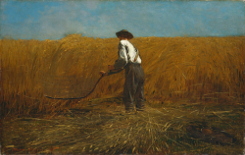The Uses of Occupations
Charity in Generals, Officers and Common Soldiers
John 15:13. Greater love has no one than this, that one lay down his soul for his friends.
Charity 164. Charity in the Commander of an army. By the commander of an army is meant its highest officer, whether he be king or archduke, or one constituted commander who holds authority from them. If he looks to the Lord and shuns evils as sins, and if he acts sincerely, justly, and faithfully in the affairs of his generalship and command, he does goods of use, which are goods of charity. And as he perpetually meditates upon them, applies himself to and executes them, he becomes charity. If he is king or archduke, he does not love war, but peace; even in war he continually loves peace. He does not go to war except for the protection of his country, and thus is not an aggressor, but a defender. But afterwards, when war has begun, if so be that aggression is defense, he becomes also an aggressor. In battle, if he has not been born otherwise, he is brave and valiant; after battle he is mild and merciful. In battle, if he is able, he wants to be a lion; but after battle, a lamb. In his inner self he does not exult in the overthrow of his enemy, and in the honor of victory; but in the deliverance of his country and his people from the invasion of an enemy, and the destruction and ruin they would inflict. He acts prudently; cares faithfully for his army, as the father of a family for his children and servants; and he loves each one of them according as he does his duty sincerely and valiantly; and many such things. Cunning, with him, is not cunning, but prudence.
Charity 165. Charity in the Officers under the Commander of an army. Each one of them may become charity, that is, an angel of heaven, if he looks to the Lord and shuns evils as sins, and sincerely, justly, and faithfully performs the duty of his office. For thus they too do goods of use perpetually, which are of charity; for their minds are in them, and when the mind is perpetually in goods of use it becomes a form of charity. His country is his neighbor; in the spiritual idea, he is its defense and security from invasion and destruction. He does not falsely exult in what is of no merit; nor does he exult even in what is deserving. He thinks this is his duty, which makes him of contented mind, and not vainglorious. In war he loves the soldiers under him, according to their valor, sincerity, and obedience. He is thoughtful for them, and desires their good as he does his own, for they are victims to the glory of his use. For officers have the glory of the use and the glory of the honor; the soldiers who are charities have the glory of the use, and not the glory of the honor. Other things with him are similar to those mentioned above pertaining to the commander of the army, for whom he acts, with a difference according to the extent of his command. I have seen such officers in a higher heaven, and I have seen officers who were not such in hell.
Charity 166. Charity in the Common Soldier. If he looks to the Lord and shuns evils as sins, and sincerely, justly, and faithfully does his duty, he also becomes charity; for as to this there is no distinction of persons. He is averse to unjust depredation; he abominates the wrongful shedding of blood. In battle it is another thing. There he is not averse to it; for he does not think of it, but of the enemy as an enemy, who desires his blood. When he hears the sound of the drum calling him to desist from the slaughter, his fury ceases. He looks upon his captives after victory as neighbors, according to the quality of their good. Before the battle he raises his mind to the Lord, and commits his life into His hand; and after he has done this, he lets his mind down from its elevation into the body and becomes brave; the thought of the Lord—which he is then unconscious of—remaining still in his mind, above his bravery. And then if he dies, he dies in the Lord; if he lives, he lives in the Lord.
Questions and Comments
- When you read Charity 164 do any good examples in history come to mind? Any bad ones?
- What does Charity 164 teach us that is helpful in trying to figure out whether a nation is justified or not in going to war?
- In Charity 165, what do you think it means to “falsely exult in what is of no merit”?
- Charity 165 may explain David’s courage in taking on Goliath, what do you think?
- What would a New Church military be like?
| previous |  |
next |
|---|


